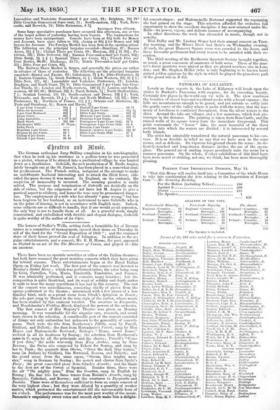C4ratrro nut( Zuoir.
The German enthusiast Jung Stilling complains in his autobiography, that when he took up his residence in a godless town he was persecuted as a pietist, whereas if he strayed into a puritanical villoge he was hunted down as a freethinker. Gabrielle, the newproduction of M. Etude Angier, lately brought out at the St. James's, has been placed in a somewhat simi- lar predicament. The French critics, indignant at the attempt to make an unfoitunate husband interesting and to attack the illicit lover, ridi- culed the piece because it was moral. In England, on the contrary, the suspicion of immorality is incurred. The seeming paradox is easily solved. The purpose and termination of Gabrielle are decidedly on the side of virtue, but the exigencies of art have led M. Augier to give a poetical aspect to adultery, and hence the tone may be pronounced danger- ous. The employment of a wife who has already " gone wrong" but has been forgiven by her husband, as an instrument to seat Gabrielle who is on the point of sinning, is not in accordance with English taste. Indeed, some subjects are so difficult to handle, that if one would avoid aspersion, the only way is not to handle them at all. As a graceful work, simply constructed, and embellished with fortible and elegant dialogue, Gabrielle is quite worthy of the author of la Gigue.


























 Previous page
Previous page